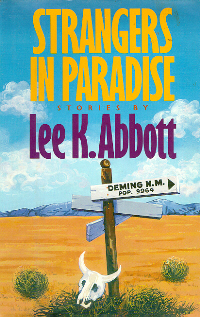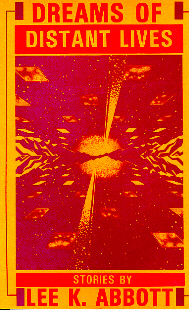NYS WRITERS INSTITUTE
HOME PAGE

 LEE K. ABBOTT
LEE K. ABBOTT
NYS Summer Writers Institute
Reading | July 18, 2007
PROFILE
Lee K. Abbott is the author of six collections of short fiction, including the forthcoming Wet Places at Noon, the St. Lawrence Award-winning The Heart Never Fits Its Wanting and the highly praised Love Is the Crooked Thing. His stories have appeared everywhere from The Atlantic to The Georgia Review and Story Quarterly to The Best American Short Stories (edited by John Updike). Strangers in Paradise include his O. Henry Award-winning "Living Alone in Iota," the Pushcart Prize-winning "X," as well as "Time and Fear and Somehow Love," which was selected for Volume III of The Editor's Choice.
"Dead-on prose that packs the punch of a Smith & Wesson, from a unique voice, one of the best in contemporary fiction.'" - Max Apple
"Mr. Abbott's stylized hyperbolic prose and loopy humor steal the show."
- The New York Times Book Review
"The minimalists had best get out of the way and make room for his lyrical and generous maximalist's prose." - Stanley Elkin
"Wild, vibrant stories, caustic and sardonic, wildly funny and bitter as grief, full of passion and perfidy." - Andrea Barrett
"Abbott writes some fulsome and fallacious prose, the kind that simply melts in your mouth, knocks your teeth down your throat. . ." - Susan Quist
In these fourteen extraordinary tales of seeming ordinary lives, O. Henry Award-winning Lee K. Abbott stakes out the territory of the American Southwest. His small-town characters are filled with dreams as expansive as the desert that surrounds them.
A guilt-ridden father drumming World War II history into his son. . .A vet turned desperado of mythic proportions. . .A golfer gone temporarily mad. Sometimes reckless, often fraught with humor of a darker sort, always downright ornery and bold, these are dangerous tales--dangerous because, drunk or sober, down-and-out or bursting with pride, Abbott's characters negotiate the bounds of acceptable human behavior with frequent missteps.
 Read here of a brief romance on a Greyhound bound out of Deming, New Mexico; of Mother's shocking souvenir--a photo of her naked self; of how the hippie Dorcey so loved Darlene that he faced down death (at the hand of Darlene's Dad) to win her; of drug love and drugged love in the groves of academe; of how love worked out amongst the grunts in Vietnam, the way it wove itself into a band of outlaws, the way it can sometimes be between a father and a son.
Read here of a brief romance on a Greyhound bound out of Deming, New Mexico; of Mother's shocking souvenir--a photo of her naked self; of how the hippie Dorcey so loved Darlene that he faced down death (at the hand of Darlene's Dad) to win her; of drug love and drugged love in the groves of academe; of how love worked out amongst the grunts in Vietnam, the way it wove itself into a band of outlaws, the way it can sometimes be between a father and a son.
Read the words that open the first story of this collection. They might have been written by the publisher to describe Lee K. Abbott's remarkable fiction:
Every time [he] told the story. . .he gave it a new title, his favorites being those with sweep and miracle.
". . .with sweep and miracle. . ." Yes, indeed, Abbott tells stories with titles that do tend to gather up and then unfurl big chunks of our human experience: Having the Human Thing of Joy, The Unfinished Business of Childhood, The Purpose of This Creature Man, and so on.
But it is the other part of the opening line that nails down the particular genius of this writer. "Every time he told the story. . ." THE story. ONE story. Told many times, in many ways, for many reasons, in many circumstances.
But in one voice and from one vision, we are grateful to note--Lee K. Abbott's inimitable own.
What is that one story and why should we be willing--much less eager--to read it more than once? A reader who has gotten this far along here will have guessed (with a little help from the collection's title) that it is the human love story. Lee K. Abbott presents, in this book, eleven examples of The Love Story, eleven examples that lay out the limitless variations inherent therein, eleven examples that glint and dazzle with his beady-eyed insights into the aged subject. Read here eleven extraordinary stories written in the grip of love.
 "In Dreams of Distant Lives stories that begin as cautious confessions implode, while stories that seem to be concerned with more cataclysmic situations devolve into revelations about the small matters of the heart. As always, Abbott’s stories are a real achievement.”
"In Dreams of Distant Lives stories that begin as cautious confessions implode, while stories that seem to be concerned with more cataclysmic situations devolve into revelations about the small matters of the heart. As always, Abbott’s stories are a real achievement.”
- Ann Beattie
"Like Jean Shepherd, Lee Abbott writes hilarious stories about common human heartbreak and fractured families, and his hapless Southwesterners and Midwesterners are American to the core. He views their middle-class lives with sympathetic irony and an eye that skillfully notes their most awkward humiliations--he is especially good at portraying the painful comedy of first love and first divorce, and many of these stories have the salty tang and twang of a good country and western tune."
- C. W. Smith
"Lee K. Abbott is John Cheever's true heir, our major American short story writer. Dreams of Distant Lives is written with his same dashing, brutal lyricism, but these are more conventional than many of Cheever's stories. As a result, he dazzles us again, but also touches us deeply, and a few of the stories explode into major events, like big Hollywood movies--large in scope and meaning and unforgettable." - William Harrison
"Although some of his stories are rueful, and all of them are serious, I think of smiles when I read Lee K. Abbott's work. There is the smile I hear on his voice as he tells his lyrical, affectionate tales. There is the smile I feel on my face as I acknowledge Abbott's perfect pitch, his just phrasing, and the tactful, tolling music with which his stories and their people purport to end, but keep living.
- Frederick Busch
"In Dreams of Distant Lives Abbott's characters are alive. This is a writer whose language explores the range of life--an accessible rich collection." - Bette Pesetsky
For additional information, contact the Writers Institute
at 518-442-5620 or online at https://www.albany.edu/writers-inst.